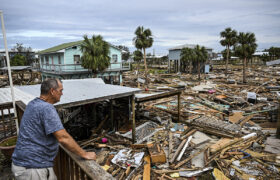10/23/2024 Nigeria (International Christian Concern) — In a report published this week, the Mo Ibrahim Foundation highlighted rising authoritarianism, deteriorating security conditions, and decreased access to various freedoms — including religious freedom — across Africa. The Ibrahim Index of African Governance is a biannual report that has studied governance on the continent since 2014.
“For almost half of the continent’s population, overall governance performance is worse in 2023 than it was in 2014,” Mo Ibrahim wrote in the report’s foreword. “Concerningly, security and democracy-related areas have deteriorated for the vast majority of Africa’s people, with more than 77% of the continent’s population living in a country where these two crucial dimensions are worse in 2023 than in 2014.”
The report considers various conditions to arrive at an overall governance score. Among other rights analyzed within the Rights and Inclusion category are freedom of religion and whether that freedom is effectively guaranteed in society, including “the extent to which, in practice, non-adherents are not required to submit to religious laws and religious minorities can freely and publicly observe their holy days and religious events.”
Worsening Conditions in Nigeria
In its analysis of religious freedom in Nigeria, the country scores only 25 points out of a possible 100 — a ranking that has remained unchanged since the report was first published in 2014. In terms of the country’s ability to effectively guarantee religious freedom for its citizens, Nigeria scored 50 points in the latest report. This is the lowest score in this category since 2016 but a slight improvement over 2014.
Several states in Nigeria maintain blasphemy laws protecting Islam from supposed insult. These laws serve to criminalize minority religious beliefs and affect not only Christians, who risk not only formal charges but also mob attacks if accused of blasphemy but also those who may ascribe to a minority sect of Islam.
Security and rule of law have deteriorated in Nigeria, with the country scoring 43.9 points in 2014 and only 39.7 — its lowest score ever — in 2023, the latest year studied. While security concerns affect all Nigerians, Christians in the Middle Belt and northern regions are particularly vulnerable to jihadist terror groups like Boko Haram and other armed extremists. Churches and Christian religious leaders in these regions have been targeted for many years.
The Targeting of Christians
A 2022 report by the Armed Conflict Location and Event Data Project (ACLED) found that violence against Christians based on their religious identity rose 21% from 2020 to 2021 and another 25% from 2021 to 2022. That represents a slightly faster growth rate than overall violence, which rose only 19% from 2020 to 2021.
International Chrisitan Concern (ICC) has analyzed kidnapping data from ACLED stretching back to 1997, and its findings show that Christians are, indeed, targeted in a relatively small percentage of kidnappings. However, in kidnappings where ACLED data reveals the religious affiliation of the victim — whether Christian or Muslim — ICC found that Christians are targeted nearly 10 times as often as Muslims.
Longstanding Tensions
Some estimates place the number of native languages in Nigeria at 525 — a staggering diversity of tongues even for Africa’s most populous country. Whatever the exact number, though, the variety of languages in Nigeria symbolizes the country’s many divisions. Political, ethnic, economic, and religious differences also abound, often overlapping to create deep-seated animosity between various groups.
This complex arrangement of communities goes back many years and was only made worse by the British, who colonized the country for a time and clumsily drew its modern borders in a way that threw warring communities into direct conflict.
President Bola Tinubu took office in May 2023 with the support of just 9.3% of eligible voters — a combination of poor voter turnout and the unprecedented success of third-party candidate Peter Obi — and repeated campaign promises to marginalize communities that did not vote for him.
Since 1999, which marks the beginning of the Fourth Republic and Nigeria’s latest attempt at democracy, Nigeria’s political elite have abided by a convention wherein Christians and Muslims alternate at the presidency and choose a running mate from the other religion, to ensure high-level representation for the country’s two biggest religious communities.
It was a surprise, then, when Tinubu cast off decades of precedence and announced a Muslim as his running mate. His choice sparked harsh criticism among non-Muslim leaders who felt that the decision marginalized the interests of other religious groups, but it was a move born out of political expediency for Tinubu, who is from the Christian-majority South and needed a popular northern partner to win votes from the north.
As unhelpful as the current administration may be toward easing religious tensions in Nigeria, the truth remains that the roots of religious violence stretch back many decades, especially for isolated communities in the Middle Belt and northern areas of the country. Religion is not the only motivating factor in the violence, but as security, safety, and rights deteriorate across Nigeria, the plight of these vulnerable Christian communities must be remembered by the Tinubu administration and the international community more broadly.
To read more news stories, visit the ICC Newsroom. For interviews, please email press@persecution.org.
The post New Report Details Deteriorating State of Freedoms in Nigeria appeared first on International Christian Concern.


